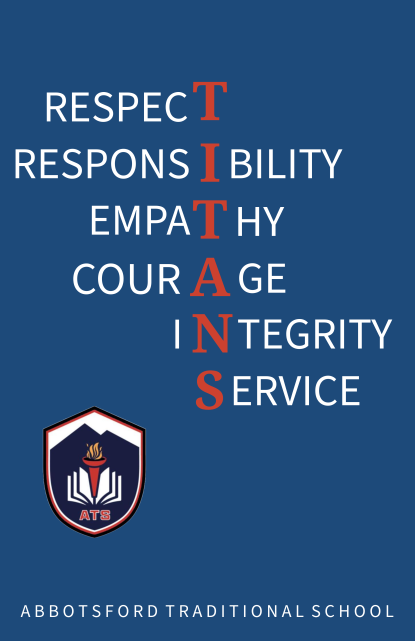Character Code & Traits
At ATS we believe that character is an important part of being an educated citizen. Social skills and virtues enable people to make a positive difference in the world. An intentional effort to bring these character traits to life in our students can play a role in creating a positive and pro-social, supportive culture in our school.
Expectations: Staff and Students are expected to promote the following character traits:
RESPECT
- Greet others and respond appropriately when they greet you.
- Use “please” and thank you” often.
- Use proper names and formal titles when addressing others (Mr., Mrs., Sir, etc).
- Use appropriate language. Swearing or rude language is offensive.
- Avoid walking between others when they are having a conversation.
- Be tolerant of different views and perspectives.
- Respect others who are waiting by proceeding to the back of the line.
- Raise your hand to speak in class.
- Share the hallways and stay to the right when possible and keep entrances clear.
- Line up in single file to enter the building and/or classes when instructed by supervisors.
RESPONSIBILITY
- Ask for permission before you borrow or use others’ property.
- Put things back where you find them.
- Cover your mouth while coughing, sneezing, or yawning.
- Maintain your personal hygiene.
- Arrive to school and class on time.
- Be prepared for class with the proper materials.
- Dress appropriately according to the weather conditions.
INTEGRITY
- Tell the truth.
- Never cheat, steal, or plagiarize.
- Always do your best.
- Wear your uniform with shirts tucked in and ensure it is neat, clean, and in good condition.
- Speak kindly of others and avoid gossip and rumours.
- Report directly to the office upon late arrival before proceeding to class.
- Accept responsibility for your mistakes.
- Do not litter and clean up your messes.
EMPATHY
- Be aware of those around you and attempt to share space patiently in common areas.
- Value others by listening and not interrupting.
- Forgive others when they make mistakes.
- Know when to say, “I’m sorry” to make peace with those who have been hurt.
- Be inclusive and do not purposefully exclude others.
COURAGE
- Always do the right thing, even when it’s difficult.
- Speak out appropriately when you or others suffer mistreatment.
- Think positively and see the possibilities in every challenge.
SERVICE
- Help others, even when not asked.
- Volunteer when adults request help.
- Hold doors open for other and help them with their belongings.
